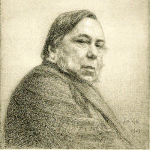Heldenmoed, huwelijkstrouw en vrouweneer. Bakhuizen van den Brink en de 'nijvere huisbestierster' Brecht Proosten († ca. 1592)
DOI:
https://doi.org/10.18352/bmgn-lchr.5711Keywords:
MarriageAbstract
'Heroism, marital fidelity and women's honour'. Bakhuizen van den Brink and the 'diligent housewife'. Brecht Proosten († circa 1592)
'Heroism, marital fidelity and women's honour' is an account of the quest for Brecht Proosten, a 'diligent housewife' and contemporary of the Dutch writer Vondel, who was praised by the historian Bakhuizen van den Brink, in his famous article 'Vondel met Roskam en Rommelpot'(Gids, 1837), though he failed to explain why she was so exemplary. The story is all about the wife of Kies, Mayor of Haarlem who hid her husband in the family home during the wave of religious persecutions under the reign of the Duke of Alva. She almost gave her husband away by becoming pregnant, but rather than betray him she sacrificed her reputation instead by telling the sheriff that the child could have been fathered by almost anyone. Bakhuizen must have read this story in Hooft's Histoorien (1642). In another publication (1843) Bakhuizen praised her for not mincing her words, however, not all of his contemporaries agreed with him on this point. During the first half of the 19th Century the story of Brecht Proosten's marital fidelity was frequently recounted, though it was noticeable that most authors only dared to write about it in covert terms. When Bakhuizen's ex-fiancée, the famous author Truitje Toussaint, removed the 'sting' from the tale in 1850 by leaving out the episode about the questionable fatherhood and her willingness to sacrifice her reputation, Brecht Proosten finally fell into oblivion.
Downloads

Downloads
Published
Issue
Section
License
Authors who publish with this journal agree to the following terms:
a) Authors retain copyright and grant the journal right of first publication with the work simultaneously licensed under a Creative Commons Attribution 4.0 International (CC BY 4.0) that allows others to share the work with an acknowledgement of the work's authorship and initial publication in this journal.
b) Authors are able to enter into separate, additional contractual arrangements for the non-exclusive distribution of the journal's published version of the work (e.g., post it to an institutional repository or publish it in a book), with an acknowledgement of its initial publication in this journal.
c) Authors are permitted to post their work online (e.g., in institutional repositories or on their website) prior to and during the submission process.
Authors are explicitly encouraged to deposit their published article in their institutional repository.











